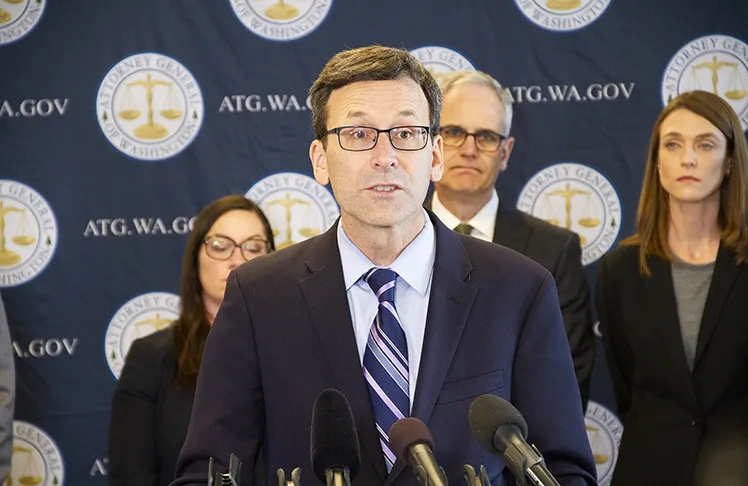
Washington State Attorney General Bob Ferguson recently announced a $10 million settlement with Metropolitan Commercial Bank as part of his ongoing effort to recover unemployment funds stolen during the COVID-19 pandemic. The settlement brings the total amount recovered through Ferguson’s innovative fraud recovery program to more than $52 million, targeting banks and financial institutions that processed stolen funds.
The Metropolitan settlement represents the second phase of the investigation, which has shifted its focus to non-bank financial technology, or “fintech,” companies that criminals used to hold and transfer stolen funds. Ferguson alleges these companies violated Washington’s Consumer Protection Act by failing to implement safeguards against fraud and money laundering.
In 2020, Metropolitan acted as the sponsoring bank for fintech company MovoCash Inc., which fraudsters used to transfer more than $15 million in stolen unemployment benefits. Using identities stolen through data breaches, criminals opened accounts with Movo and moved the illicit funds through Metropolitan. Ferguson’s office asserts that Metropolitan failed to enforce proper anti-fraud and anti-money laundering protocols, allowing the transfers to proceed.
Ferguson, the only state attorney general to pursue such an investigation, has leveraged state asset forfeiture laws to recover stolen taxpayer dollars. During the first phase of the investigation, his office reclaimed $42 million from 26 financial institutions, making Washington a leader in pandemic fraud recovery. Ferguson has vowed to continue these efforts.
“More than four years ago, criminals targeted our state unemployment fund, and my office has not stopped working to recover what they stole,” Ferguson said. “Washington has been a national leader in this effort. We were the first state to use forfeiture laws to recover stolen dollars frozen in accounts and the first to resolve an investigation into a fintech company involved in moving these funds. There is still more work ahead.”
The resolution requires Metropolitan to pay $9 million in restitution to Washington’s Employment Security Department (ESD), with the funds returned to the state unemployment trust and federal treasury. An additional $1 million will cover investigative costs and support future consumer protection initiatives. Metropolitan has also agreed to adopt stricter policies to prevent money laundering of unemployment benefits through fintech platforms.
In early 2020, Washington’s unemployment insurance program became one of the first to face an unprecedented wave of fraudulent activity. Criminal networks exploited personal information from data breaches to file false claims and steal $647 million in benefits. Within two weeks of detecting the fraud, the ESD halted payments and prevented more than 100,000 additional fraudulent claims. Its efforts to recover stolen funds, combined with Ferguson’s investigation, have returned $432.6 million so far—roughly two-thirds of the stolen amount.
Despite these successes, $214.4 million remains unrecovered. Even so, Washington’s fraud losses accounted for just 1% of the $21.7 billion paid in unemployment benefits during the pandemic. By comparison, other states experienced far greater losses, including California, which lost $18.7 billion, Arizona with $4.4 billion, and Virginia with $1.6 billion.
Metropolitan served as the issuing bank for digital banking programs offered by fintech companies, which often rely on regulated financial institutions to provide access to the U.S. financial system. Some fintech companies, such as MovoCash, allow criminals to exploit these partnerships by bypassing regulatory oversight. Between April and July 2020, Metropolitan accepted more than 3,700 fraudulent money transfers from Washington’s unemployment fund through Movo accounts. After being alerted by regulators, Metropolitan froze $5.5 million in stolen funds and returned it to the state.
Ferguson subsequently recovered an additional $732,000 from Metropolitan’s accounts using his asset forfeiture powers. The bank cooperated with the attorney general’s investigation, which ultimately resulted in the $10 million settlement to avoid litigation.
Washington’s aggressive approach to recovering stolen funds has set it apart from other states. Ferguson’s office relied on fraud detection data from the ESD, which identified accounts flagged for suspicious activity, including those receiving payments from multiple states, accounts with deposits linked to several individuals, and accounts where the beneficiary’s identity did not match the applicant. Subpoenas to 35 banks across the country uncovered accounts holding over $1,000 with red flags for fraud.
The state’s efforts to reclaim funds were bolstered by close collaboration with financial institutions, many of which returned stolen money voluntarily. Ferguson’s team also pursued litigation to recover funds from noncompliant entities, helping preserve critical resources for unemployed workers and taxpayers.
A report from the federal government estimates that pandemic unemployment fraud nationwide amounted to as much as $135 billion, impacting 53 state and territorial programs. Washington’s proactive measures, including the use of forfeiture laws and cooperation with financial institutions, have made it one of the most successful states in recovering stolen funds.
Metropolitan’s settlement requires the bank to adopt stringent measures to prevent similar fraud in the future. The Attorney General’s Office continues to assist in federal investigations seeking to recover additional stolen funds and hold financial institutions accountable for their role in pandemic fraud schemes.
“Washington was more successful than other states in mitigating and recovering unemployment fraud losses, helping to preserve funds for unemployed workers and taxpayers,” Ferguson said.